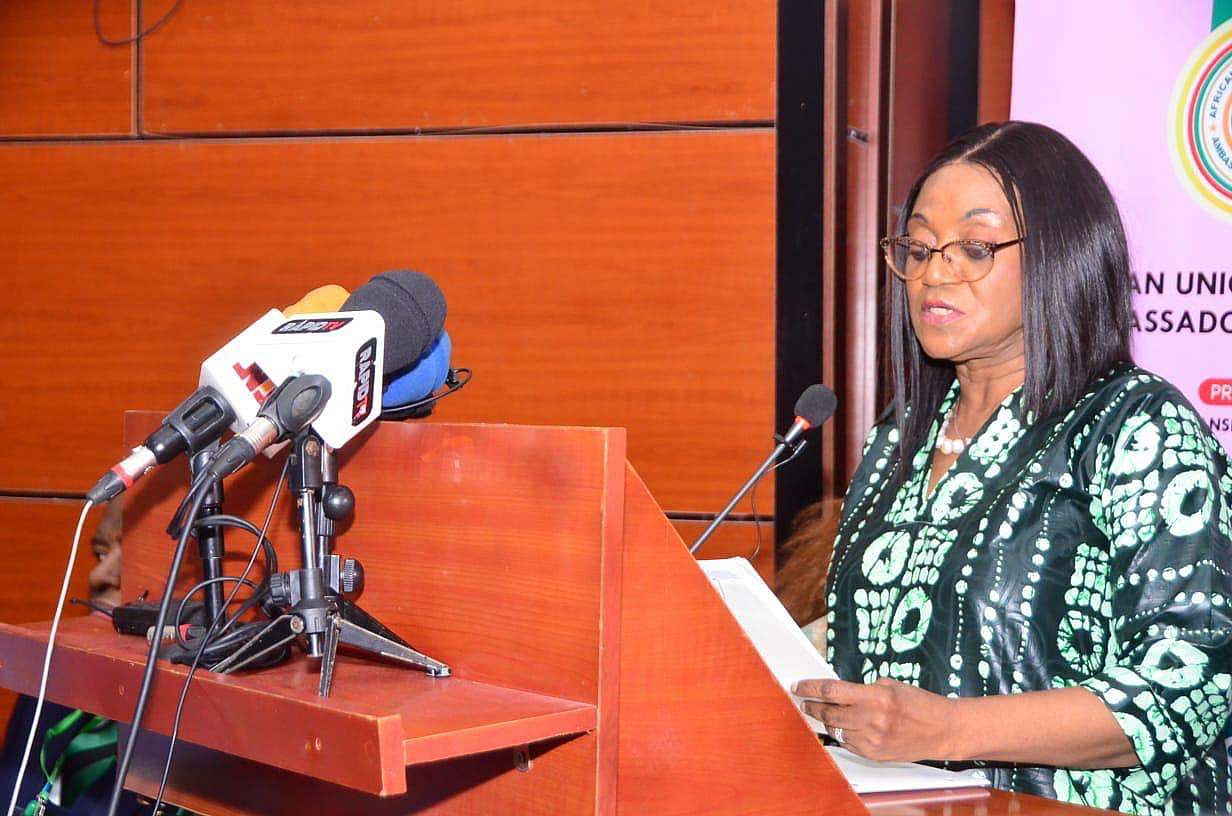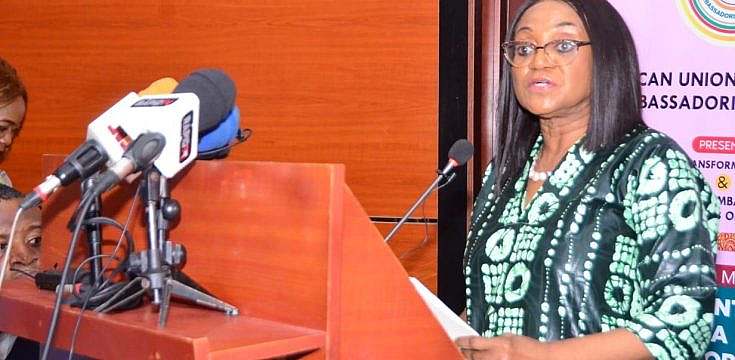The Nigerian Law Society 2Nd Annual General Conference.
Dates : 18th to 20th December , 2024.
Theme: The Role Of The Nigerian Law Society To The Nigerian Society.
“Justice, justice shall you pursue….” Deuteronomy 16:20.
•Dr. Ugoji Adanma Eze, Esq., Chairman , Human Rights Committee , AfBAR
1. Parashat Shoftim, meaning Judges, instructs the Israelites to appoint judges who will always give righteous judgments. The principle the judges should follow is: “Justice, justice shall you pursue” (Deuteronomy 16:11). Thanks in part to the late Justice Ruth Bader Ginsburg, who framed this passage and displayed it in her Supreme Court office, this has become one of the most famous passages in the Bible. What can we derive from the fact that the word justice is repeated twice in the verse?
The Torah espouses that, to assure justice, the judges must not distort judgment, which might favor one side or another; must not favor persons — the rich and powerful often get favorable treatment; and must not take bribes.
In Leviticus, the Torah states: “You shall do no injustice in your judgment. You shall not lift (i.e. treat as superior) the person of the poor, nor shall you give [extra] importance to the person who is mighty. Rather judge your neighbors righteously” (Leviticus 19:15). This means that the rich, powerful, and well-connected should not get preferential treatment. Even in countries where all are equal before the law, the rich and powerful get better outcomes—whether it is because of better lawyers, more access, or higher status.
In Exodus, the Torah warns against this phenomenon, and asks for a special effort to assure we “do not pervert the judgment of the poor in his cause” (Exodus 23:6).
The prophet Isaiah counts as one of the hallmarks of the Messianic age that the Messiah “will judge the poor justly and decide with equity for the meek of the earth” (Isaiah 11:4).
In other words, justice must consider equity, and the basic needs of the poor litigant have a weightier claim on the law. The same holds true in welfare laws. In the commandment to give tzedakah, the Torah says, “You shall grant him what he needs.
There are two additional meanings of “justice, justice, shall you pursue.” One is that justice should include equity. And second, that society must pursue justice justly, strengthening—and not undermining—the principles of justice for all. The system of law and legislation, which has some objective and fair processes, should not be undermined for a cause, no matter how noble it may be .
2. “Justice, justice you shall pursue…” (Deuteronomy 16:20)
We are commanded to pursue justice, but this is not a simple task. It is not always easy to do the right thing. Sometimes justice for some is not popular or appears to cause trouble in the eyes of others. Sometimes working towards justice makes our lives more difficult than they would have been otherwise. In our world today, there are so many special circumstances and exceptions to the rules that it can be difficult to know what the just and right thing is to do. Despite the challenges, we are instructed to pursue justice, knowing that the one true judge will see the truth in our actions and our intentions.
The Nigeria legal profession, working together and cooperatively, we can achieve balance and accomplish more than if we work individually. What can we accomplish if we work together? To pursue justice, we must work together. We must think about justice and make our own small contributions to pursuing that goal collectively and not individually. If we do so collectively as the legal profession, our communal efforts will result in something we could never achieve alone.
As I look back on the past year and forward to the coming year, in 2025 I am focusing on how I can pursue and dispense justice with other global legal organizations and bars . We live in a global village In conclusion:
3. The role of a law society in a society is to support the legal profession, the administration of justice, and the rule of law:
• Support the legal profession. Law societies offer career support, including events, e-learning, and a jobs board. They also provide communities for members to expand their networks and learn more about specific areas.
• Support the administration of justice. Law societies ensure access to justice for the public. For example, the Law Society of Singapore has a subsidiary called Pro Bono SG that provides justice to the needy and vulnerable. The Nigeria Law Society.
• Support the rule of law. Law societies uphold the rule of law by ensuring that the bar is independent. They may also monitor solicitors’ practices to ensure they are following the relevant regulations. • Advocate for reform. Law societies may advocate for the reform of democracy and the strengthening of the nation’s institutional framework.
Law plays a vital role in society by promoting justice, equality, and social order. It also provides a framework for economic activity, and establishes rules for contracts, property rights, and intellectual property.
Artificial Intelligence and The Emerging Continental legal Practice. 
“Afriwise’s collaborative ecosystem affirms that the best solutions for Africa come from Africa and how, once again, Africa is leading the way globally, not in spite of but exactly because of its unique challenges and versatile dynamics.” —– Afriwise CEO Steven De Backer.
“Promoting equal, meaningful access to legal representation in the United States Justice system is critical to ending poverty combatting discrimination and creating opportunity.”—Center For American Progress.
1. Introduction.
As world leaders continue to strategize on how to build back better from the impacts of the COVID-19 pandemic, it is important that we do not let short term post pandemic measures prevent us from addressing the longer-term emergence of Artificial intelligence and the emerging continental legal practice.
Artificial Intelligence is creating dynamic new opportunities and indeed challenges in the legal sphere; with a diverse range of issues emerging from the rapidly evolving global legal and regulatory environment.
Afriwise was launched in 2018, establishing an innovative approach to maintaining and building a cross -border legal-intelligence database in Africa; Leading organizations rely on to discover answers to their legal questions.
Africa is the perfect innovation incubator, despite the lack of up -to -date and quality legal information and distinctive legal challenges: such as incomplete and incoherent legal frameworks, unusual concepts, lack of transparency and critically established practices that differ from written laws.
The convergence of AI and the legal practice includes:
• Cybersecurity and Data Privacy.
• Intellectual Property.
• Technology Transactions.
• Corporate.
• Governance and Regulatory Compliance.
• Data Ethics and Fairness.
Artificial Intelligence (AI) is poised to fundamentally reshape the practice of law on the African continent.
GPT-3 AND GPT-4d, demonstrate widely available technology can perform sophisticated research and writing tasks, with a proficiency which previously required highly trained individuals.
In Africa, law firms that effectively leverage emerging AI technologies, will be able to offer services at lower cost, higher efficiency and above all with higher odds of favorable outcomes in litigation.
Conversely, law firms that fail to capitalize on the power and emergence of AI, will be unable to remain cost – competitive, losing clients and in the long run undermining their ability to attract and retain talent.
2. What Is Required?
Resilient recovery from the impacts of the COVID-19 will not be possible without conscious efforts to boost global resilience on all fronts, social, economic, digital, scientific, innovative and technological. It is imperative to take strategically calculated and measurable collective actions to support the efforts of developing countries in special situations. It is pertinent to work together to mitigate the impacts of the gap in Science, Innovation and technology in developing countries.
There is a need to support these groups of developing countries to catch up to the emerging scientific, technological and innovative transformations; and to improve access for researcher and scientists in developing countries to publication, data and STI initiatives.
Partnerships also plays an important role, thus enabling researchers in developing countries with access to databases, information resources, academic and professional journals.
A. Efficiency Improvements: AI can be used to swiftly produce initial drafts, advancing arguments, citing the pertinent case law, rebutting arguments advanced by opposing counsel.
In short, AI will make it much more efficient for attorneys to draft documents requiring a higher degree of customization; such as contracts, responses to interrogatories, summaries for clients; visual aids for use in trial.
During trials, AI could be used to analyze a trial transcript in real time and also provide input to attorney’s that can assist them select which questions to ask.
B. The Legal Tech startup Ecosystem. With the emergence of AI on the continental practice, there will inevitable be the creation of new legal tech companies. For example, Casetext, is part of what will become a rapidly emerging ecosystem of legal tech companies, offering AI products based on large language models.
Opportunities also exists to utilize AI for more fully automated provision of legal services.
Legal and indeed policy frameworks will need to be updated to facilitate innovation in this space, while also identifying and protecting against the associated risks.
C. New Skilled Required. The development of new skills will be required including knowing how to select the correct AI tool for a specific task; knowing how to construct the correct queries and evaluate the quality, relevance and above all accuracy of the responses and being able to synthesize the overall results into a cohesive and actionable picture. The issue of confidentiality also arises; thus, Attorneys needs to pay attention to confidentiality. Law firms and schools need to adapt to the changing landscape; and ensure that they are abreast with the new tools in this new technological and innovative environment.
D. Broadening Access to Legal Services. AI has the potential to broaden access to legal services, which would otherwise be unavailable to numerous individuals and small businesses. AI will make it less costly to initiate and indeed pursue litigation.
E. Human Intelligence Is Still Imperative. It would be foolhardy to utilize the extraordinary advances of AI to minimize the significance of the human element in the practice of law. AI is reshaping the landscape for both providers and users of legal services.
3. Africa Leads the Way for Artificial Intelligence in Legal Practice. Whilst on the one hand, there are challenges in African legal context, these challenges have indeed created fertile ground for building one of the world’s innovative legal -tech platforms: Afriwise.
Afriwise is set to leapfrog as a global leader, once it has acquired the leading AI -based legal software developer Pythagoria, and releasing its AI on Afriwise’s unmatched and unraveled database of African legal information.
A. Artificial Intelligence You Can Trust. Afriwise has managed the great feat of creating a unique model which combines legal-tech, the deep intelligence of eminent African Lawyers and AI; which can guarantee the integrity of its underlying information.
B. Pythagoria. Is an AI -based legal software developer, with a wide comprehension of the legal world. The collaboration with Afriwise will benefit the African continent as a whole.
C. Data Integrity at Its Core. Afriwise is harnessing the power of Pythagoria by creating solutions such as AI -driven regulatory monitoring, real -time legal analysis, based on legislation, lawyers input, case law and AI -based API’s for developing smart applications.
The lawyers in Afriwise ecosystem know the legal problems in their respective countries better than anyone else.
D. AI Kept in check by human expertise. Afriwise does not need to build in the guardrails, which other AI-powered legal tech companies need to safeguard; as Afriwise has a unique way of producing and indeed maintaining legal intelligence, in collaboration with law firms, which provides significant benefit for the use of AI.
In short Afriwise, gains from legal information which has been fact-checked, prepared and updated by leading lawyers.
4. Guiding Questions.
a. How can we strengthen resilience considering the decade of action and delivery for the SDGs?
b. How can we help countries in special situations to better adapt to and cope with the gaps to ensure that no one is left behind?
C. How can we limit the consequences of inequalities and or prevent the potential for deterioration of the situation, particularly for women and girls?
d. How can we capitalize on our efforts to recover better from the COVID-19 pandemic induced global shocks to fix the gaps and strengthen resilience to inequalities in developing countries.?e. Who really benefits from these innovations?
F. How many of us will ultimately profit from this Fourth Industrial Revolution, or from the green technology?
h. How can we ensure that those in developing countries are partakers in the groundbreaking advances in Artificial intelligence, robotics, Machine learning. biotechnology and the internet revolution?




